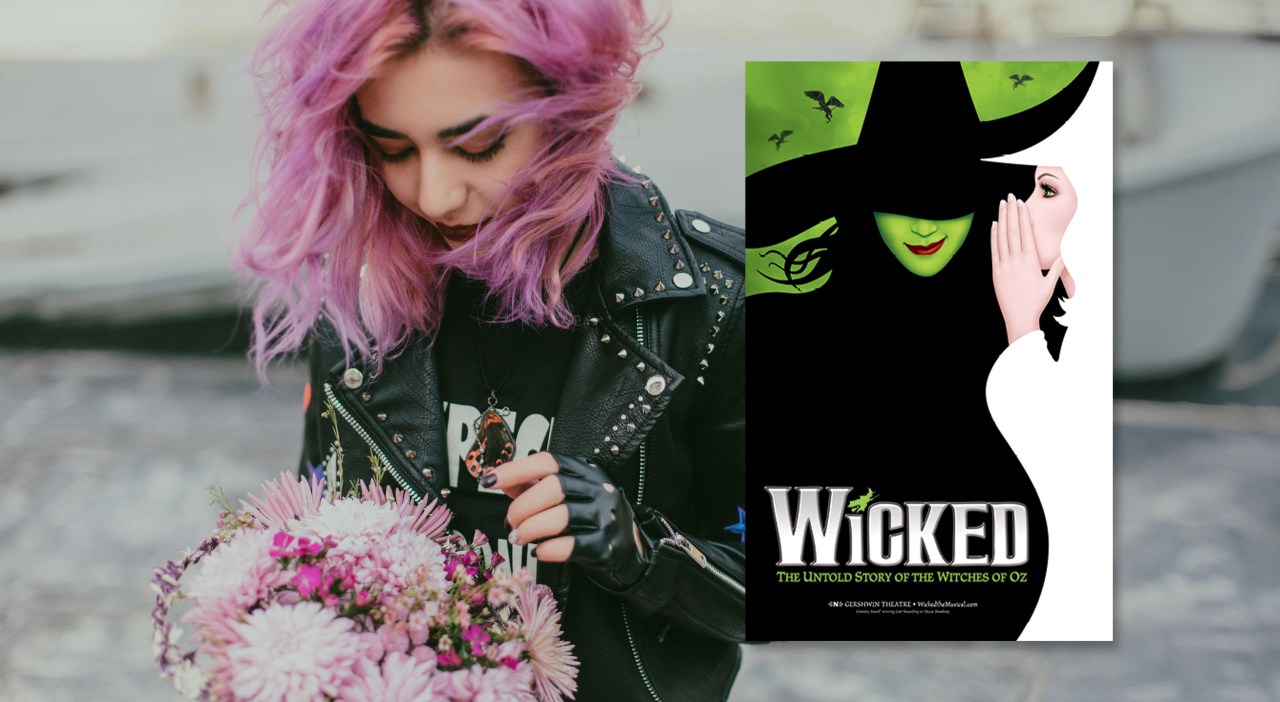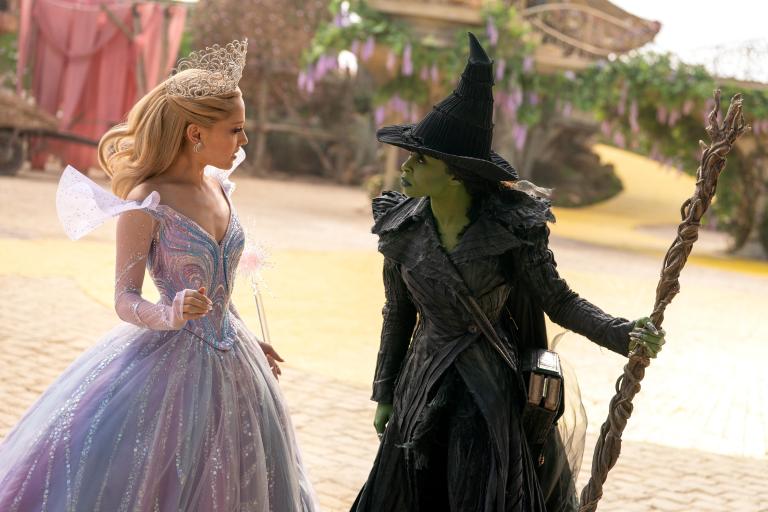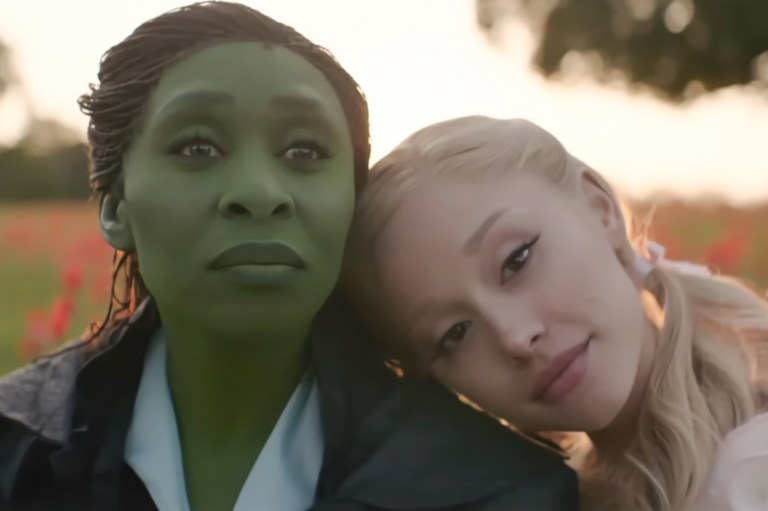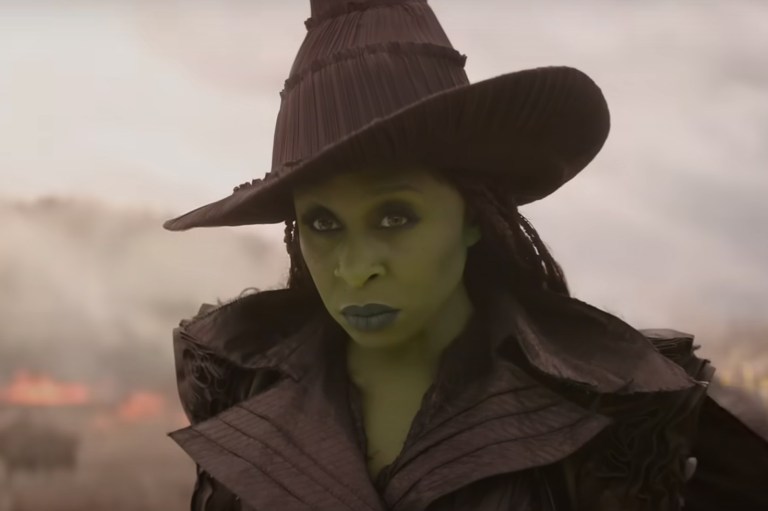
How ‘Wicked’ Became An Anthem For Pop-Punk Millennial Girls
By ![]() Jamie Lerner
Jamie Lerner
2003 was an iconic year for theater geeks and emo kids alike—Wicked and Avenue Q joined the perennial catalog of Broadway musicals while bands like Fall Out Boy, Blink-182, Yellowcard, and more released some of their most iconic albums. We were in the height of My Chemical Romance and Avril Lavigne, with Paramore soon to come. When we bring all of these elements together, it becomes clear that Wicked is still an anthem for the pop-punk millennial girlies of the early aughts.
At the time, PacSun popularized skater shoes, Claire’s chokers were in, and many young pre-teens were just trying to figure out who we were in a quickly-changing world. Then, Wicked came along. Full of earworms, quotable moments, pop music influences, and led by two women, Wicked was unlike anything most 11-year-olds had ever seen or heard. As a former theater kid who still goes to pop-punk music festivals, I was in the middle of this cross-cultural intersection, so here’s “my frank analysis” on how Wicked became an anthem for pop-punk millennial girls.
‘Wicked’ is a feminist manifesto.
The original story was written by Gregory Maguire, but the musical was a collaboration between composer Stephen Schwartz and the book writer, Winnie Holzman. Winnie adapted the story to add feminism as an overarching theme, placing Elphaba and Galinda in equal importance at the top of the show and making their friendship central to the outcome of the story. When young girls were finding their footing in a typically male-led world, looking towards two powerful women (along with another in Madame Morrible) gave us examples of how women’s futures can be “unlimited.”
While many musicals before 2003 placed an emphasis on romance, the central relationship in Wicked is the female friendship between Elphaba and Glinda even though there is a love triangle. It’s one of the most evident examples of “chicks before d–ks” in an industry where women are so often pit against one another. Of course, this backfired when Idina Menzel and Kristin Chenoweth were up against each other in the race for Best Actress in the 2003 Tony Awards, but hopefully, the message of Wicked still led to a generation of glass-breaking women who refuse to conform to the gender norms of pop music versus the male-led pop punk genre. Soon after Wicked, the Hayley Williams-led Paramore became one of the most successful bands in the genre, proving that women can be groundbreaking pop punk princesses.
Embracing individuality is one of the main themes of both ‘Wicked’ and pop-punk music.
At a time when the growing internet made it seem more important than ever to go along with the “popular” trends, Wicked reminded us to embrace our individuality instead. Elphaba represents going against the grain, while Galinda represents the societal need to blend in to survive. Musical theater kids have always felt *different* from the more mainstream sports stars and “popular” kids. So when a musical fell into our laps with the stereotypical “popular” girl befriending the weird girl, who then wins out when it comes to getting “the guy,” we all immediately fell in love with it.
While Galinda, representing society, tells Elphaba she has to be popular and conform to get what she wants, Elphaba gets a version of what she wants by holding onto her individuality. Her strong beliefs combined with her unique “verdigris” and talents are what ultimately allowed her to both “defy gravity” and expectations. However, this often led many theater kids to feel lonely and misunderstood, which is why many of us also gravitated towards pop-punk music.
Green Day’s “Basket Case” could have been sung by Elphaba with lyrics like, “I am one of those melodramatic fools … Sometimes I give myself the creeps,” painting oneself as an outsider who wants to both love and hate themself at the same time. Avril Lavigne’s 2002 debut album, Let Go, featured the song, “Anything But Ordinary,” which draws on a similar theme of loving one’s individuality while still feeling like an outcast.
This brings us back to Wicked in which Elphaba repeatedly shares her desire to be “normal” without giving up what makes her special. “Shouldn’t a girl who’s so good inside have a matching exterior?” she sings in The Wizard and I. As she watches Galinda and Fiyero, she sings, “I’m Not That Girl,” longing for love while staying true to herself: “Don’t dream too far, don’t lose sight of who you are,” she sings.
Many theater kids have felt and been treated like Elphaba their whole lives, even while musical theater lovers have also been painted with the preppy, upbeat disposition of Glinda, furthering the feeling of being misunderstood. Pop punk music gave those of us who never felt like a Glinda another outlet to feel unique.
‘Wicked’ has emo elements that mirror pop-punk music.
One of the most quotable lines in Wicked is when Galinda tells Elphaba, “You know black is this year’s pink.” It’s layered by both allowing theater kids to embrace their inner darkness and suggesting that “emo” is becoming popular, which it was in 2003. When we think of pop-punk, there are two elements to the genre: both pop and punk. It draws from a movement of underground rebellion, inspired by bands like Bikini Kill and the Dead Kennedys, but found a way into the mainstream by using popular devices (i.e. love songs, catchy melodies, etc.).
Wicked includes the tension and collaboration of the popular in Galinda and the punk in Elphaba. Musically, the minor chords that introduce the show set the tone as a dark piece of musical theater, typically a joyous genre. And while Wicked has its pinker songs, its steps into darkness, such as edgy love songs like “As Long As You’re Mine,” the pessimism learned in the lyric, “No good deed goes unpunished,” and its underlying political anarchical messaging makes it just as emo as our favorite pop-punk bands. It’s no wonder that Panic! at the Disco’s Brendon Urie and My Chemical Romance’s Gerard Way loved musical theater just as much as any millennial girl.










